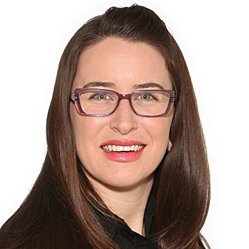April 2017

Biography
Dr. Jenna Guynn (formerly Currier) earned a Bachelor’s degree in Biochemistry from University of Delaware and an Associate’s degree in Criminal Justice from Grossmont College. She conducted her doctoral dissertation research with Mirek Styblo optimizing analytical techniques for precise measurement of arsenic species in biological materials. Following graduation, she completed a summer teaching position at Duke and a postdoctoral fellowship through the Oak Ridge Institute for Science and Education at the US EPA. Jenna has earned numerous awards for her research at annual meetings of the SOT and Environmental Mutagenesis and Genomics Society. She is now a Senior Scientist in Product Stewardship at Reynolds American, Inc. Services Company in Winston-Salem, NC.
What is your story? How did you get interested in toxicology?
I don’t have a traditional education path. I went to an independent-study charter high school and graduated at age 16 while attending community college classes. I was interested in a variety of fields so I took several non-traditional classes. I actually became interested in criminal justice and got an associate’s degree in forensic science. I soon realized that there was not much career advancement in that field with only a two-year degree and wanted to look for something else. Because I did pretty well in my chemistry and biology classes, my professors advised me to get a Bachelor’s degree. I transferred to the University of Delaware and decided to major in Biochemistry. My father became terminally ill when I was a teenager so I had long been interested in health sciences and always wanted to know what was happening at a cellular level. My longer track to complete an undergraduate education (8 years from high school to Bachelor’s) gave me more opportunities to intern in the chemical industry and conduct undergraduate research.
My experience in the pursuit of knowledge and solving problems gave me the courage to move on to graduate school. I felt that biochemistry was very focused on specific molecular pathways and proteins, but I wanted to tackle something with a broader scope. I met a toxicologist at a Women in Science networking event and she directed me to the SOT website, where I found the Curriculum in Toxicology at UNC.
What did you do after you graduated?
I wasn’t entirely sure what I wanted to do after graduating. I knew that I enjoyed teaching and mentoring but didn’t have lot of opportunities to teach during graduate school, so I found a summer teaching job at Duke to gain additional experience. I was going to focus on teaching but I had also put my information out on the SOT job board, and was approached by an investigator at EPA for a post-doc position. Though I knew I didn’t want to do academic research, a job in the government agency gave me the opportunity to learn new techniques and be involved in environmental policy. My postdoctoral fellowship at the EPA consisted of computational modeling and I was also able to gain exposure to the risk assessment process.
What do you do now?
My current position is a Senior Scientist at RAI Services Company, a tobacco company. I found this job through a posting on an NIEHS trainee newsletter and contacted the recruiter and hiring manager. I work in product integrity to support product development and stewardship focusing on materials, ingredients, technologies, and manufacturing processes. I would describe it as consumer products toxicology.
Can you describe what that looks like? Day to day?
Hmm, that’s a hard one. I do so many things! I am involved in research projects, helping to develop and design experiments to support product development and regulatory submissions. I am mostly brought in to support and consult as a toxicologist. I review product requests, attend meetings providing toxicology support for new products, write and review process or manufacturing requests, risk assessments, and technical documents.
My job has a lot of variety, which I do well in. I found that I excelled in a more fast-paced and dynamic environment as opposed to long-term, open-ended kind of research.
Where do you see the future of toxicology?
There is always going to be a need for toxicologists. There is always new literature, new knowledge coming out so we must continually review and revise our assumptions and assessments. We are always rethinking approaches to provide the best regulations.
Any advice to current students/postdocs?
Seek out leadership opportunities and don’t stay solely focused on your research activities. Look for opportunities to get involved in the community, professional societies, and graduate groups on campus.
What were the most valuable skills you gained from your PhD?
I think the most valuable skill I gained was being able to learn new techniques and access the information or people needed to accomplish the research goals that I set.
What do you enjoy doing in your free time?
I have been really getting into weightlifting and participating in fitness, like CrossFit!